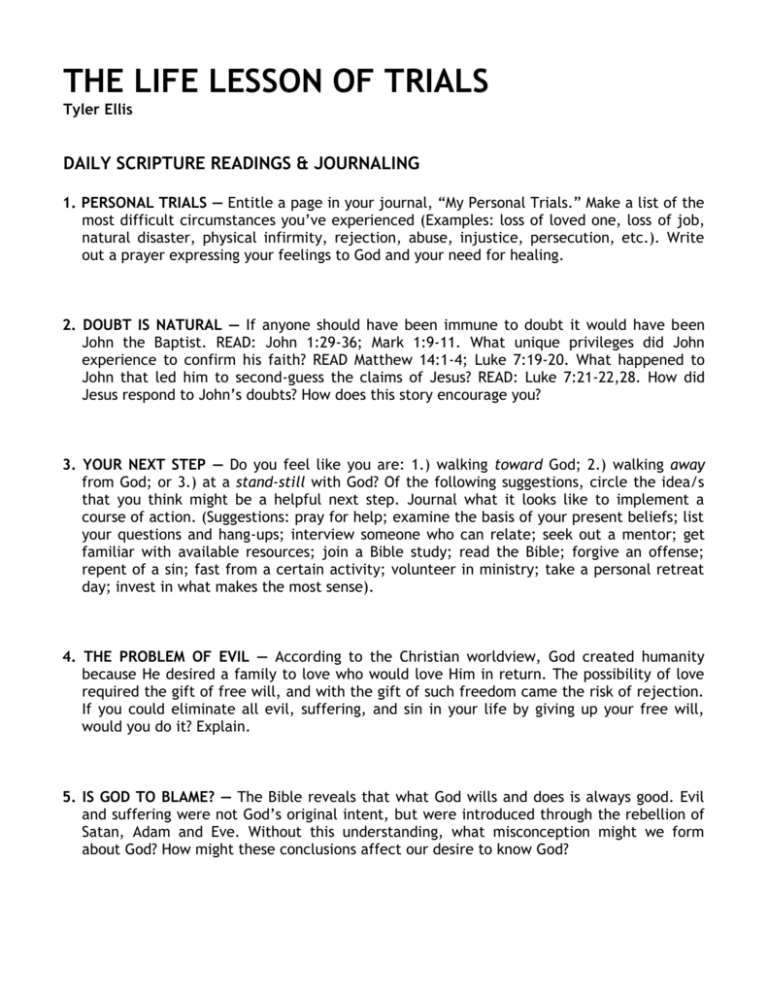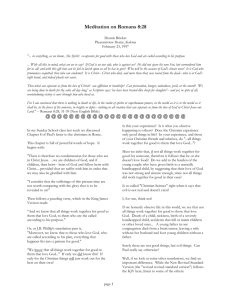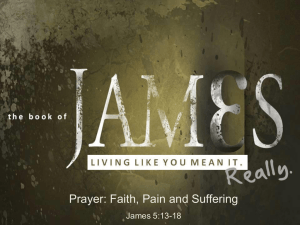the life lesson of trials
advertisement

THE LIFE LESSON OF TRIALS Tyler Ellis DAILY SCRIPTURE READINGS & JOURNALING 1. PERSONAL TRIALS — Entitle a page in your journal, “My Personal Trials.” Make a list of the most difficult circumstances you’ve experienced (Examples: loss of loved one, loss of job, natural disaster, physical infirmity, rejection, abuse, injustice, persecution, etc.). Write out a prayer expressing your feelings to God and your need for healing. 2. DOUBT IS NATURAL — If anyone should have been immune to doubt it would have been John the Baptist. READ: John 1:29-36; Mark 1:9-11. What unique privileges did John experience to confirm his faith? READ Matthew 14:1-4; Luke 7:19-20. What happened to John that led him to second-guess the claims of Jesus? READ: Luke 7:21-22,28. How did Jesus respond to John’s doubts? How does this story encourage you? 3. YOUR NEXT STEP — Do you feel like you are: 1.) walking toward God; 2.) walking away from God; or 3.) at a stand-still with God? Of the following suggestions, circle the idea/s that you think might be a helpful next step. Journal what it looks like to implement a course of action. (Suggestions: pray for help; examine the basis of your present beliefs; list your questions and hang-ups; interview someone who can relate; seek out a mentor; get familiar with available resources; join a Bible study; read the Bible; forgive an offense; repent of a sin; fast from a certain activity; volunteer in ministry; take a personal retreat day; invest in what makes the most sense). 4. THE PROBLEM OF EVIL — According to the Christian worldview, God created humanity because He desired a family to love who would love Him in return. The possibility of love required the gift of free will, and with the gift of such freedom came the risk of rejection. If you could eliminate all evil, suffering, and sin in your life by giving up your free will, would you do it? Explain. 5. IS GOD TO BLAME? — The Bible reveals that what God wills and does is always good. Evil and suffering were not God’s original intent, but were introduced through the rebellion of Satan, Adam and Eve. Without this understanding, what misconception might we form about God? How might these conclusions affect our desire to know God? 6. SPIRITUAL BATTLE — READ: John 10:10; Acts 10:38. What role might Satan play in the evil and the suffering experienced in our world today? Why do you suppose God doesn’t just eliminate Satan now? 7. FAIRNESS — READ: Romans 3:10,23; 6:23. In light of humankind’s rejection of God, what point do you think C.S. Lewis is trying to get across when he states, “The question is not ‘Why do the innocent suffer?’ but rather ‘Why don’t we all suffer more?’” Do you agree with him? Why or why not? Entitle a page in your journal, “Undeserved Blessings” and make a list of specific gifts you’ve received from God. 8. JESUS’ SUFFERING — If anyone was innocent before God and did not deserve to suffer it was Jesus. Yet, in order to provide a way for us (who are guilty) to be saved, he volunteered to suffer that he might satisfy God’s justice on our behalf (2 Corinthians 5:21). READ: 1 Peter 2:21-25; Hebrews 12:2-3; John 16:33. In your journal, respond to each of the following words as they challenge the perspective you have concerning your own suffering: love, humility, repentance, thanksgiving, endurance, hope, trust, and joy. 9. THE REASON WE FOLLOW GOD — READ: Job 1:1,6-12. What do you think Satan meant when he asked Yahweh, “Does Job fear God for nothing?” How do you think God would respond if Satan were to ask the same about you? 10. THE “PROMISE” OF PROSPERITY — READ: Mark 4:3,5,16-17; Luke 8:13. Different people possess different concepts of God and decide to follow God based on different motives and expectations. Make a list of as many different concepts, motives and expectations as you can think of. Then try to predict how each individual might respond to trials based on those presuppositions. 11. GOD’S TESTS & DISCIPLINE — READ: James 1:2-3,12; Ps. 66:8-12; Hebrews 12:6-10. Though God did not intend evil to enter our world, He sometimes uses life’s circumstances to test us. God cares and notices how we handle success and failure, peace and crisis, health and illness, temptation, persecution, etc. According to these Scriptures, what purposes might God’s tests serve in our lives? 12. TRUSTING & THANKSGIVING — READ: Exodus 17:1-6; Hebrews 4:1-2. According to these Scriptures, what two things must be “mixed” together in order to experience peace in the midst of trials? READ: 1 Thessalonians 5:18; Ephesians 5:20. What examples can you think of concerning what it means to give thanks “for all things” and “in all things”. 13. GOD WORKS FOR GOOD — READ: Acts 16:22-35; Philippians 1:12-14. How did Paul respond to trials? How did God use Paul’s trials for good? Rewrite Genesis 50:20 and Romans 8:28 in your own words. 14. PRAYING FOR FAITH — READ: Romans 5:10; 8:32. If you have trusted Christ for the greatest thing, which is salvation, are you trusting him in the lesser needs of everyday life? Write out a prayer addressing your attitude and level of trust in these areas, and ask the Lord to patiently increase your faith. 15. DEVELOPING CHARACTER — List the three most difficult trials you have experienced in your past. What did you learn? How have those trials defined who you are? What good has God brought from those situations? How can you use those experiences to comfort others? 16. PRAYER — READ: Psalm 106:19-23. How does this story restore your hope that prayer can make a difference? How does it challenge you to know that the outcome of our prayers is influenced by the following variables: 1.) God's will (1 John 5:14); 2.) The faith of the person being prayed for (Mark 6:5-6); 3.) The faith of people praying for others (James 1:67); 4.) Persistence (Luke 11:5-9); 5.) The number of people praying (Colossians 4:3-4; 6.) Human free will (2 Peter 3:9); 7.) Angelic free will (Daniel 10:12-13); 8.) The number & strength of spirit agents (2 Kings 6:16-17); 9.) The presence of sin (Psalm 66:18)? 17. COMFORTED TO COMFORT — READ: 2 Corinthians 1:3-7. God comforts us through people and comforts people through us. Who has God used to comfort you in your trials? Who do you know that needs comfort? What steps can you take to comfort them? 18. GOD’S PATIENCE — READ: 2 Peter 3:9. What insight does this verse give concerning one reason why God currently tolerates evil? What advantages are there in allowing people to see evil firsthand and then inviting them to reject it in favor of living under God’s leadership? Do you believe this is the best way to deal with evil? Why or why not? 19. ETERNAL PERSPECTIVE — READ: 2 Timothy 4:17-18; 2 Corinthians 4:16-18; Romans 8:18; Revelation 21:1-7. If you knew for sure that God would rid the world of evil somehow and restore life to His original intent, how would you feel about having to tolerate evil and suffering now? 20. REWARD — READ: Luke 2:22-23,35; Revelation 2:10. Just as a loving father rewards his child for being obedient and faithful in their responsibilities, so too, our Heavenly Father loves us and extends the promise of eternal rewards. Among the many things that God will reward us for is the endurance of suffering. Does this promise surprise you, motivate you or humble you? Explain. TRIALS-RELATED PROJECTS INTERVIEWS (Suggestions: lessons, regrets, struggles, advice, positive outcomes, etc.) [ ] Someone who has overcome a great trial [ ] Someone who is presently going through a trial [ ] Someone who has been persecuted for their faith LETTERS [ ] Write to someone who comforted you in the past [ ] Write to someone who needs comfort [ ] Write to someone experiencing persecution for their faith MISCELLANEOUS [ ] Research and volunteer to assist an individual or organization that can benefit from your services (those experiencing loss, illnesses, disabilities, domestic violence, etc.). [ ] Invite struggling people to campus ministry activities (sports, meals, outings, trips, Small Group, etc.) REFLECTION [ ] Watch & discuss a related movie (The Passion of The Christ, Facing The Giants, Luther, Chariots of Fire, Rudy, It’s A Wonderful Life, The Pianist, A Woman Who Willed A Miracle, Bruce Almighty, Patch Adams) [ ] Start a prayer list or group (asking people in need for requests) [ ] Expression (write a song, poem, blog, or create collage relating to trials) [ ] Personal retreat day (schedule a Sabbath day in a quiet place – bringing your Bible, journal, music, water bottle, etc.) [ ] Scripture memorization (stick post-it notes of related passages in prominent places) [ ] Prayer walking with a friend (walking through town, campus, hiking, stargazing, etc.) RECOMMENDED READING Is God To Blame? Gregory Boyd Satan And The Problem of Evil, Gregory Boyd Letters From A Skeptic, Gregory Boyd What’s So Great About Christianity, Dinesh D’Souza If I Perish, Esther Kim Broken Dreams, Larry Crab Fox’s Book of Martyrs Coach Wooden’s Pyramid of Success, by John Wooden and Jay Carty Man’s Search for Meaning, Victor Frankl Facing Your Giants, Max Lucado Sundays With Scottie, Milton Jones Left To Tell, Imacule Illibagiza The Shack, William P. Young Safely Home, Randy Alcorn How Could God Allow Suffering And Evil? Garry Poole RECOMMENDED MUSIC If You Want Me To, Ginny Owens There Will Be A Day, Jeremy Camp Come For Me, Charlie Hall I Will Rise, Chris Tomlin I Believe In Love, BarlowGirl My Hope, David Crowder*Band CONTRIBUTORS Milton Jones Glynda Crownover Caleb Stroud Jennifer Drescher Adam Wilson Tyler Ellis







